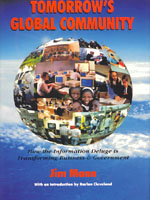Tomorrow's Global Community:
How the Information Deluge is Transforming
Business and Government
By Jim Mann
October 1998
ISBN: 1-891696-06-8 
480 p.
$24.95 Cloth
Visit Jim Mann's web site on 21st Century Social Evolution
In one of the most groundbreaking and thought-provoking looks at the future since Alvin Toffler’s The Third Wave, media marketing expert Jim Mann foresees the end of top-heavy, centralized bureaucracies in favor of global communities based upon cooperation, the free flow of information, and amicable decision-making.
The author’s central thesis states that the information deluge has promoted uncertainty, fear, distrust, overspecialization, groupthink and alienation. "No single person nor entity has all the knowledge necessary to make the right decisions," says Mann, "and thus we are witnessing a transformation toward smaller partnership networks in which every individual is free to make decisions in participation with the knowledge of others."
He says, "Human evolution has reached the stage where individuals know too much for blind reliance on bosses and too little for total reliance on themselves; therefore, tomorrow’s society, rather than a pyramid, will be like a tapestry, a closely woven fabric of intertwined interests. People will belong to many communities which will overlap and interpenetrate."
The book is called Tomorrow’s Global Community: How the Information Deluge is Transforming Business and Government. It is published by BainBridgeBooks and distributed by Trans-Atlantic Publications Inc., Philadelphia. It will be available in November 1998.
With the accelerated rise in information, the author argues that bureaucracies in both the public and private sector will eventually wither away and be replaced by a knowledge-based economy that "promotes the free exchange of ideas and encourages cooperation, openness and trust rather than competition, secrecy and suspicion."
In addition to the information deluge, Jim Mann offers several current trends that point to the eventual demise of centralized authority, including the growth of the private sector; global cooperation and supranational organizations; devolution of power to regional and lower governments; and the formation of quasi-governmental bodies (such as state and regional consortiums).
He also offers examples of partnership networks existing today, from a small home builder to the industrial giant ABB, which is revolutionizing business management by favoring knowledge networks over centralized authority.
"I believe that the bottom-line paradigm," says Mann, "will eventually be replaced by a paradigm of business balance, where the purpose of every commercial activity will fill the needs of all the participants without harming others. Instead of business as a wealth-creator, we should think of it as a benefits-creator."
He also says, "It is time to replace the corporation paradigm with a partnership paradigm that will establish democratic rule in business, making empire building less likely, restoring human values to the world of commerce, and eliminating the back-stabbing ethics of office politics."
Jim Mann believes that patents and copyrights limit the expansion of human knowledge by promoting a closed, secretive society. Instead, he advocates a "gift" economy where ideas cannot be bought nor sold but rather are shared for the common good.
The author also sees changes from a knowledge-based economy that allow philanthropy to replace entitlements, with smaller, manageable partnerships providing insurance for all members of society. In addition, he sees the end of ineffective learning factories. "Public and higher education systems will transform into privatized partnership networks, returning control to educators and 'coaches' not administrators."
"Tomorrow’s global community will distribute and exercise authority according to the decisions to be made. No longer will legislators be given the power to make decisions in many different areas independently of those who elected them. Nor will managers be empowered to make decisions for those who work for them. Instead, each decision will be made by collaboration and amicable interactions among the individuals concerned," Mann says.
Tomorrow’s Global Community sells for $24.95 in hardcover and contains 480 pages, including an extensive bibliography and references. Its ISBN is 1-891696-06-8. It is available nationally through Baker & Taylor Company.
Click here for reviews of Tomorrow's Global Community
Jim Mann is president of Jim Mann & Associates, a consulting firm specializing in the marketing problems of communications media. He is also founding editor of Publishing Trends and Trendsetter and a former editor of The Gallagher Report. He has been adjunct professor of marketing and advertising at the University of New Haven and director of the business school's new products and concepts laboratory. He has published articles and books about the communications industry for the past 50 years. He has also served as a consultant to such firms as ITT, Panasonic, Reader's Digest, Fairchild Publications, Cablevision Inc., Ladies' Home Journal and Harcourt Brace Jovanovich. He and his wife reside in Connecticut.
Return to main page of Trans-Atlantic Publications